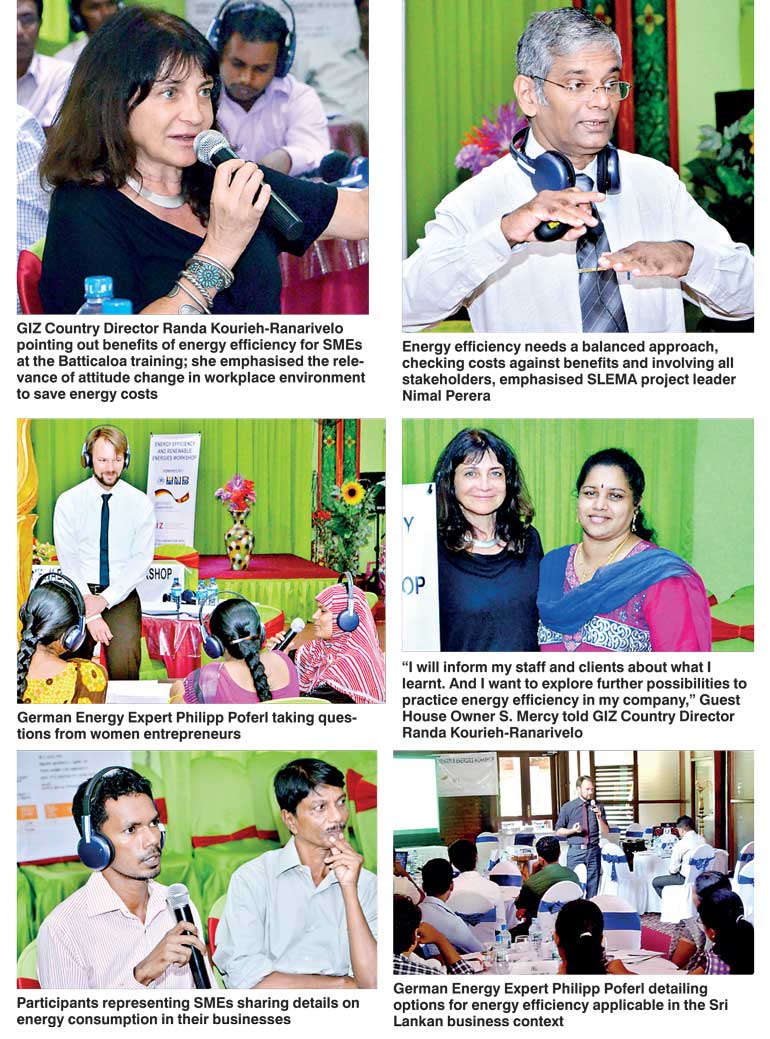Sunday Feb 22, 2026
Sunday Feb 22, 2026
Friday, 4 September 2015 00:00 - - {{hitsCtrl.values.hits}}
GIZ and partners support with energy audits and project ideas, help companies to reduce electricity bills

More than 120 Small and Medium-sized Enterprises (SMEs) benefited from trainings on energy efficiency and renewable energies held in Jaffna, Batticaloa, Anuradhapura and Matara recently. The training series was the start of a project that will reach 600 SMEs island-wide, with a focus on North and East.
“Energy efficiency and renewable energy can boost companies. I’m pleased we successfully kick-started this initiative together with our partners. Reduced energy costs and awareness on energy efficiency will increase the competitiveness of local companies, and help them create more jobs for sustainable growth,” said GIZ Country Director Sri Lanka and Maldives Randa Kourieh-Ranarivelo, attending the workshop in Batticaloa.
Participants were owners and managers of hotels and guest houses, hospitals, textile, tea and ice factories, rice mills, poultry farms or garages. Advice was delivered by German and Sri Lankan experts, and simultaneously translated into local languages. The program covered technical aspects of cooling, heating, lighting, air-conditions and motors. Basics of cost-benefit analysis and assessing financial viability of potential investments were also introduced.
“I learnt that reducing air conditioning by 1 degree can reduce the related energy bill by 7%,” said Mercy S., owner of a guesthouse in Pasikudah. “I will pass this on to my team and clients now. I am also keen to install a photovoltaic system on my rooftop. I will request assistance for an audit to assess the financial viability of this.”

“We received a lot of useful and practical advice, that we can immediately implement,” said the principal of a private school in Anuradhapura. “I will pass this knowledge on to my team and students, and educate them about what each and every one can to do reduce our energy bill.”
“Staff awareness is a key success factor to realise initial cost savings,” agreed Philipp Poferl, senior expert of arqum, a Munich-based consultancy commissioned by GIZ to conduct the program. “However, investing in energy-efficient machinery and renewable energies can make an even more substantial difference in the long run.”
Poferl worked closely with Nimal Perera and other experts of the Sri Lanka Energy Managers’ Association (SLEMA) to deliver the technical content in a comprehensive manner. Selected students of the Faculty of Engineering of University of Jaffna/Kilinochchi were also involved in the workshops in Jaffna and Batticaloa and received training. In addition, Sri Lankan technology providers attended the sessions in all four locations and presented their solutions to potential clients.
Deutsche Gesellschaftfür Internationale Zusammenarbeit (GIZ) GmbH initiated this project titled ‘Financing Energy Efficiency for SMEs’ under the Sri Lankan-German SME Development Program. The objective is to help SMEs reduce their production cost through energy efficiency measures. For this purpose, SMEs get support to develop realistic project proposals – and are brought a step closer to appropriate funding.
Partners in the effort are DFCC Bank, Hatton National Bank, the Sri Lanka Energy Managers’ Association (SLEMA) as well as regional chambers of commerce, coordinated through the Ceylon Chamber of Commerce (CCC). Two international consultancy companies from Germany, arqum and adelphi, support the implementation of the project.
“This project will not only help Sri Lankan small and medium-sized companies become more competitive – it will also give a boost to green technologies and innovation, especially in our focus regions Northern and Eastern Province,” explained Sri Lankan-German SME Development Program Senior Advisor German Müller.
Through an earlier GIZ project, 30 SMEs island-wide had been trained to implement Energy Efficient/Renewable Energy (EE/RE) measures. The companies involved had been able to reduce their energy cost by20 to 50 percent, with low-investive measures only.
Because entrepreneurs cited lack of sufficient and acceptable credit as the main barrier to implementing the EE/RE projects, two major banks are now involved from the start in ‘Financing Energy Efficiency for SMEs’. DFCC and HNB respectively will sponsor training workshops for 300 SMEs each.
The banks and the Sri Lankan and international experts follow an integrated approach to ensure necessary support for SMEs at each step of the investment process. In addition, bank staff is being capacitated, in order to establish industry benchmarks and adjust procedures to be able to better serve the SME sector.

“DFCC being the premier development bank in the country has always had special focus on energy efficiency and renewable energy having pioneered financing of mini hydro, wind and village hydro projects in the country. With this venture we will be able to engage more actively with SMEs and other industry customers on energy savings potentials in the future,” said DFCC Bank PLC Branch Banking Senior Vice President Dharmasiri Wickramatilake.
“This program comes at the right time, as it will strengthen our position as a leading bank, linking cutting edge international expertise to the needs of our customers in the regions,” said Hatton National Bank Manager-SME Senaka Wijekoon.
Regional chambers help to reach enterprises not served by partner banks. In a special workshop, staff of 18 regional chambers was trained on energy efficiency before the workshop in order to select the right participants. “We received very positive feedback from them as well as from the companies who attended the program,” said Ceylon Chamber of Commerce Secretary General/CEO Mangala Yapa.
